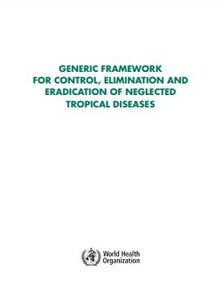In formulating definitions for control, elimination and eradication of neglected tropical diseases, public health workers need to consider the diversity of their causative pathogens, epidemiology, interactions with humans, ecology and other factors influencing transmission in specific communities. For some chronic diseases, such as soil-transmitted helminthiases, light infections rarely cause disease, and the main aim of interventions, such as preventive chemotherapy, is to reduce heavy infections in a population using regular, large-scale treatment. Conversely, for some acute diseases, such as human rabies, infection invariably leads to severe disease or death, and the main aim of interventions is complete prevention of the infection. |

